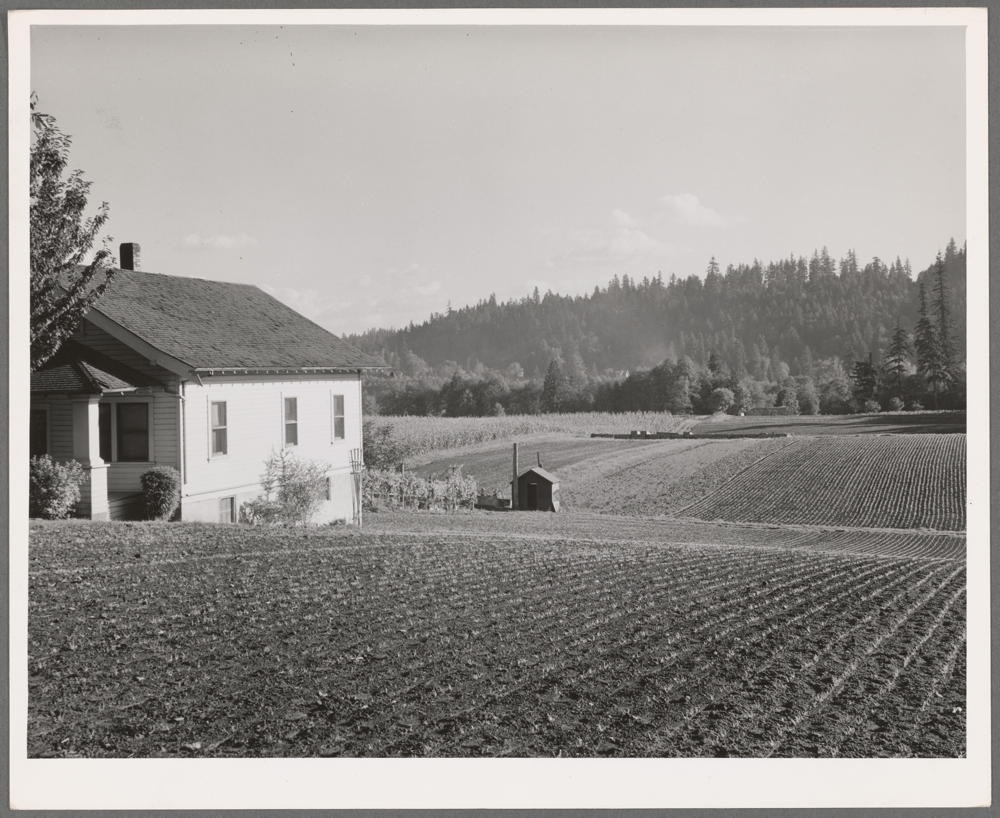EdenAtTheEnd

Russell Lee:
Fall spinach. Willamette Valley,
Clackamas County, Oregon (1941)
"We were guilty of a tenacious innocence …"
The EdenAtTheEnd of the Oregon Trail was both everything dreamed of and a severe disappointment. Despite all the focused aspirations, nothing about the underlying human condition turned out to be any different there. People continued to be born and retired at just about the historical rate. It didn't turn out to even distantly resemble Heaven on Earth, though it seemed plenty close enough after the centuries of trials required to arrive there. The weather offered more rain than most thought necessary, though it somehow avoided the deluges remembered from the Appalachians, Tennessee Valley, Missouri, and Nebraska. Tornados were gratefully unheard of there. Snowfall was rare, and the soil ranged from fair to absolutely heavenly. Roads were muddy, but enough unwanted trees stood that they could be harvested to create corduroy roads. Resources at first seemed infinite. Salmon in the Spring routinely came in enormous sizes; one fish would be the capacity of a buckboard wagon. We complained about having to eat fresh salmon more than a couple of times each week. It was readily available for seven in season.
The natives barely noticed our arrival, and those that did either died of our diseases or were quickly subdued and moved to reservations away from the more promising of these promised lands. Most of us were not Israelites, but we behaved as if we were merely reclaiming our ancestral homeland rather than overrunning others'. It was not really anybody's fault that we brought the smallpox and measles, malaria and whooping cough, and nobody's fault that the natives lacked antibodies. The natives blamed the missionaries who gave them blankets carrying smallpox and duly massacred them according to honorable custom, after which the so-called settlers captured a few to represent the perpetrators and hung them in a circus-like atmosphere in Oregon City to the general satisfaction of crowds. They claimed to bring civilization to the territory, though they first brought devastation. The government handed out free land they didn't own to people who firmly believed they were owed it. That land would soon enough own them.
This crowd of newcomers was as old as history by then. Their forebears had participated in previous occupations and similar revelations with precisely the same outcomes. They experienced peace for a time before somehow undermining their good fortune. Whether they became envious of their neighbors' luck or overly defensive about their own, each generation had managed to overrun their expectations and sour their so-called native soil. My spirit fondly remembers Acquataine, a country my forebears left nearly thirty generations ago. It, too, promised to serve as Heaven on Earth. The Romans had recognized that, as had the Franks and the Huns, each lusting after other peoples' Eden and only succeeding in bringing it firmly back into this world. There was no more any Heaven on Earth than there was one anywhere else, for Heaven exists solely in anticipation; the longing promise was only intended to soothe in times of extremes. Other than that, what could possibly be the use of anybody's Heaven on Earth or anywhere else? We exclusively aspire for what we'd be much better off never acquiring.
It remains in our power to create little Edens, for these require little more than focused acceptance. One must refuse to lust after better, however alluring any apparent better might seem. One must find satisfaction with what one's got and somehow outgrow the human desire for betterment. The gods of continuous improvement were always false; their promises were merely self-destructive. We'll all eventually turn to dust, and we must, by nature, always prove to be somewhat disappointed with our inevitable fate. We're motivated by the shortcomings we notice. They encourage us to migrate toward some apparent better. We always imagine that better place to finally be the EdenAtTheEnd, though we do not really aspire to end this experience. We want to live forever, and we're destined to disappoint that primal aspiration. We do much inadvertent damage, whatever good we might wreak. Our fate was bought and sold long before we ever aspired for anything. We were guilty of a tenacious innocence before we were ever guilty of anything else.
©2024 by David A. Schmaltz - all rights reserved


